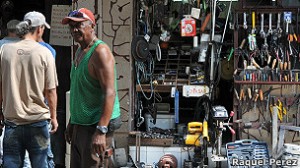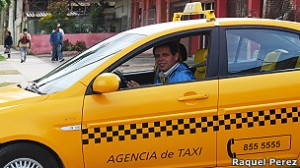LA HABANA, CUBA -The Economic reforms met four years and seem to leave more than a Cuban unsatisfied: the considered slow, shallow draft, they are not comprehensive and, above all, do not feel that their lives have improved substantially.
 * 150,000 Cubans were given land for free but have nowhere buy machinery or supplies to make them produce.*
* 150,000 Cubans were given land for free but have nowhere buy machinery or supplies to make them produce.*
Pretty is for sure, but also influences a different style. Leading the country a more cautious leadership to announce successes, which analyzes the impact of any measures and seeks to change the model without criticizing the above strategies.
Marino Murillo, head of the committee driving the reforms, told BBC News that the slowness is due to “a shortage of foreign currency liquidity, the global credit difficult and we need to prepare mentally for the changes.”
The enactment of each of the reforms is accompanied by absurd lengths, sections showing the lack of definition in the model to build and reveal the fear felt by some sectors of the consequences of the changes.
PERCEPTION OF PEOPLE
“The changes here in the east where I live are very slow and have not been to improve the ordinary citizen,” said Ricardo Hernandez, a builder in the province of Holguin idle since returning from his mission in Venezuela.
A young professional in Santiago de Cuba said the BBC “that the reforms would have more impact have not been implemented yet, I mean the migration, dual currency, because the university internet can work for themselves.”
“The changes are slow, but you have to adapt because the country has a somewhat bad situation,” said the operator Abelina Perez of the province of Villa Clara, who claims to be receiving help from his son because the salary “I enough to live. ”
 * Self-employment has grown less than expected because they have no wholesalers or seed money.*
* Self-employment has grown less than expected because they have no wholesalers or seed money.*
The dissatisfaction of the Cubans is also a subjective factor. For decades, optimism today marked a rhetorical clashes with the harshness of speech by Raul Castro, who openly say they are on the brink, that wages are not enough or that unanimity is false.
Another contrast is the implementation of local pilot programs prior to widespread changes throughout the country. Before they took the ideas into practice more quickly, some successfully and others culminated became notorious failures in huge costs.
In addition, the official stressed that there is no “reform” but an “update model”. This conveys to people the idea that no changes of substance, but gives the government the freedom to change everything without having to make a critical assessment of the previous model.
“NO MAJOR PROBLEMS SOLVED”
The dissident economist Oscar Espinosa told the BBC that “reforms are a failure and lost precious time. Delivery of land, for example, was made without providing the minimum conditions to farmers thus the results are minimal” .
He adds that “the self-employed is good because it gave life to the society but does not solve the main problems. We need to give impetus to small and medium enterprises, to let people care what you need and to develop”.
The self-employment has stagnated, but had not really grown much. 70% of the new self are people who were “unrelated occupationally”, in other words are self-employed clandestine just legalized.
Only 80,000 former employees of the State applied for licenses, a tiny amount when the plan of layoffs expected to spend a million private sector employees. The stagnation may be due to lack of capital and inputs for starting a business.
 * Some services are going through at the hands of its workers but very slowly.*
* Some services are going through at the hands of its workers but very slowly.*
The work of researchers at the Centre for the Study of the Cuban Economy suggest that reforms slowed because the government wants to set up which country and what are the main guidelines to build that model.
Theoretical claim that the draft is deep reforms, but in practice what was done is remove more prohibitions and issue some orders that are already obsolete because the changes may not be comprehensive and coherent if we do not know where you are going.
They believe that it is important to define what the agricultural model, and from there, out of the way all that hinders the production of food, ensuring inputs, credit, wholesale markets and allowing import and export co.
But Raul Castro confirmed this week in Parliament that there are “initial steps for the conceptualization of the country’s economic model and approved (…) all of which lays the foundation to run most substantial transformations.”
REFORMS AND TEN “buts”
1 – Were handed over 1,300 acres to the farmers for free. “But” not now allowed to build houses on them, not sell products, not allowed to import, they limited the free sale of their productions and usufruct times are very short.
2 – Quadrupled the number of employed persons. “But” is limited to less than 200 trades and hamper development, as the limit of 50 chairs in restaurants. There are no wholesale markets, missing inputs in the shops, bank lending is insignificant and so far it was forbidden to associate in urban cooperatives.
3 – Authorized access by Cubans living on the island to the hotels and these became the second group after Canadians. “But,” are treated as second-tourists who pay premium prices, have banned the excursions on boats, treatment and service is poor quality and not respecting the contract packages.
4 – Authorized the use of cell phones to Cubans and jumped from 250,000 to 1,300,000 users. “But,” despite the growth, remain among the highest in the world: the minute local call around U.S. $ 0.40.
5 – Created a national tax system. “But” until now the large state enterprises working with central government budget and there are no taxes on the wages of most workers.
6 – It was decided to pass into the hands of its workers of services. “But,” there has only been a couple of taxi companies and hairdressers, while still studying take similar steps in the hospitality and transportation.
7 – Reduced food subsidies. “But” the wages did not grow enough to compensate or increased supply of products for lower prices in the free state or private market.
8 – Authorizes the sale of automobiles. “But,” limited to used vehicles, the zero miles just may buy a small number of citizens, after obtaining a letter of authorization from the government.
9 – Aim to decentralize political power. “But,” the experience is developed only in two newly created provinces and Mayabeque Artemis-and advances in the greatest secrecy.
10 – It promotes greater autonomy for state enterprises. “But,” do not clarify what role the market, do not question the state monopolies, competition is not promoted business and remains the protection of unproductive firms.
Sources: Letters from Cuba / FernandoRavsberg/ BBC / UK / RaquelPerez / TheCubanHistory.com
Cuba and the changes did not Come / The Cuban History / Arnoldo Varona, Publisher


